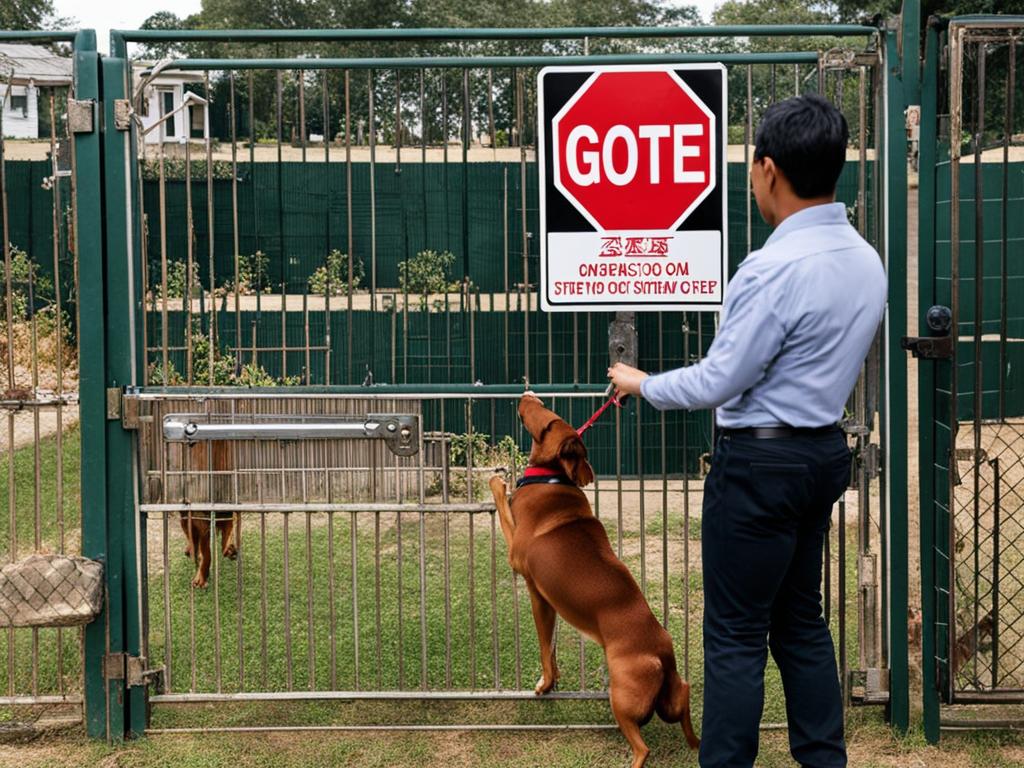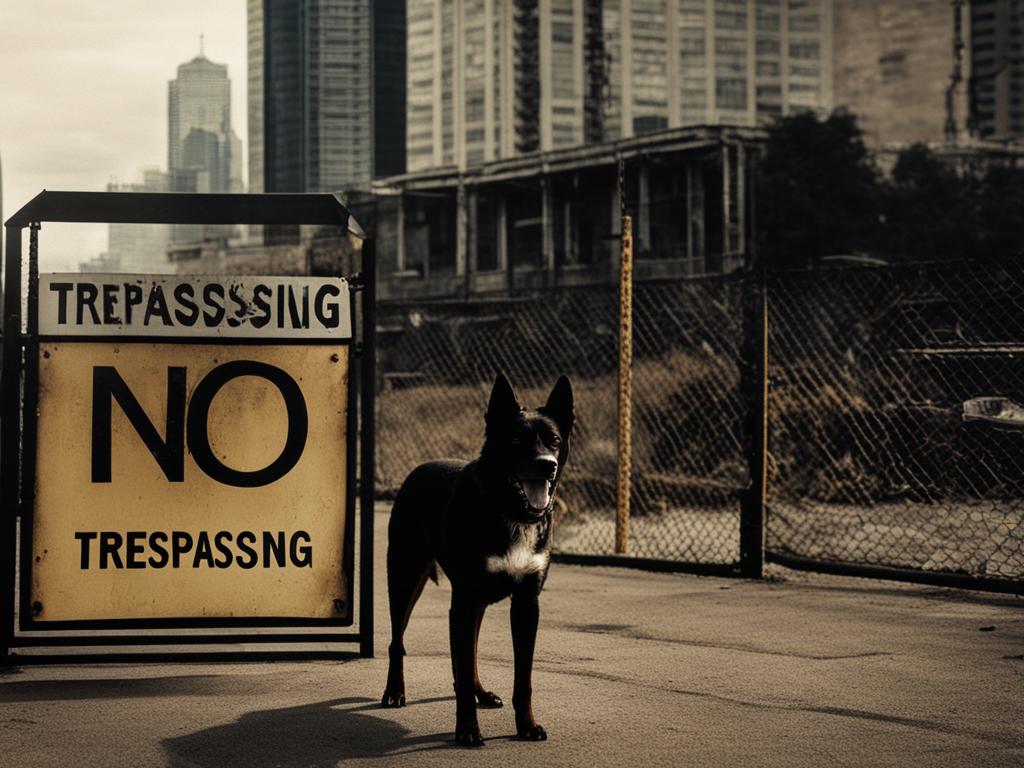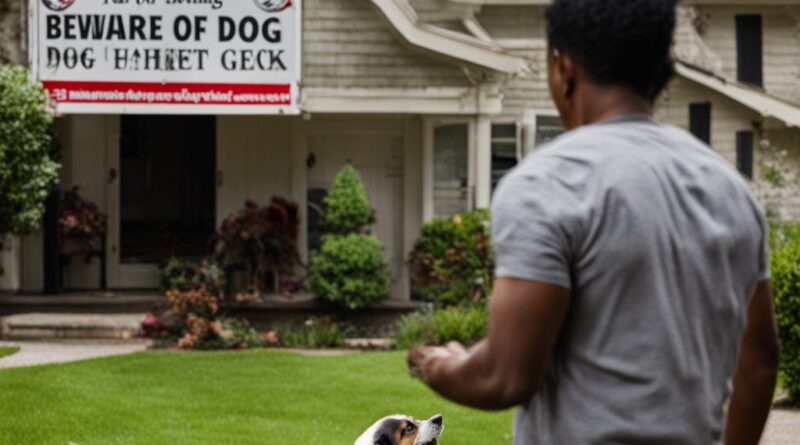What Happens If a Dog Bites Someone on Your Property?
If a dog bites someone on your property, it’s important to understand the legal consequences and your liability as a dog owner. The specific laws and regulations surrounding dog bite incidents vary from state to state, so it’s crucial to know your rights and obligations based on your location.
Some states operate on a strict liability basis, which means that as a dog owner, you are automatically held responsible for any injuries caused by your dog, regardless of whether or not you were aware of your dog’s aggressive tendencies or previous biting incidents. Other states follow the “one bite” rule, which holds the owner liable only if they knew or should have known about their dog’s propensity to bite.
Understanding the dog bite laws in your state will help you navigate the legal implications and potential consequences associated with dog bites on your property. It’s also essential to have liability insurance coverage that includes dog bites to protect yourself financially.
Key Takeaways:
- Legal consequences of dog bites on your property vary depending on the state you’re located in.
- Some states follow strict liability, holding dog owners responsible for injuries caused by their dogs regardless of prior knowledge.
- Other states have the “one bite” rule, where liability depends on the owner’s knowledge of their dog’s potential to bite.
- Understanding the specific laws in your state is crucial to know your rights and obligations as a dog owner.
- Having liability insurance coverage that includes dog bites can protect you from potential financial liabilities.
Dog Bite Laws and Liability: Understanding Your Legal Obligations
When it comes to dog bites, understanding the laws and legal liabilities in your state is crucial. Dog bite laws can vary, but two common legal approaches employed by states are strict liability and the one bite rule. Strict liability means that dog owners are automatically held responsible for any injuries caused by their dogs, regardless of the dog’s history. On the other hand, the one bite rule holds owners liable only if they knew or should have known about their dogs’ dangerous propensities.
Personal injury claims for dog bites are also a significant aspect of dog bite laws. If your dog bites someone, they may file a personal injury claim seeking compensation for their injuries. This could result in financial liabilities, including medical expenses, plastic surgery costs, pain and suffering, and even lost wages. Understanding your legal obligations as a dog owner is essential to protect yourself from potential legal and financial consequences.
To illustrate the variations in dog bite laws, here’s a table that compares two states:
| State | Legal Approach | Additional Considerations |
|---|---|---|
| State A | Strict Liability | No exceptions |
| State B | One Bite Rule | Liability if owner knew or should have known about dog’s propensity to bite |
As you can see, State A follows a strict liability approach, holding owners responsible regardless of their dog’s history. In contrast, State B adheres to the one bite rule, where liability is based on the owner’s knowledge of their dog’s biting tendencies. These differences highlight the importance of knowing the specific laws in your state to understand your legal obligations and potential liability.
It’s important to consult with a legal professional familiar with dog bite laws in your state to ensure you have the necessary information and guidance in the event of a dog bite incident. By understanding your legal obligations, you can take proper precautions and protect yourself from the legal and financial implications that may arise from a dog bite on your property.
Defending Knowledge of Dangerous Propensity
When faced with a dog bite claim, it is crucial to defend yourself against the allegation that you knew or should have known about your dog’s dangerous propensity. By presenting evidence and building a strong legal defense, you can prove your lack of knowledge and potentially mitigate your liability. Here are some strategies to consider:
Gather Evidence of Non-aggressive Behavior
To defend your knowledge of your dog’s temperament, collect evidence that your dog has never bitten anyone before. This can include documentation of your dog’s training, vet records showing a lack of previous aggressive incidents, and testimonials from friends, family members, and neighbors who can vouch for your dog’s non-aggressive behavior. By presenting this evidence, you can demonstrate that your dog does not have a dangerous propensity.
Evidence of Non-aggressive Training
Another way to prove your lack of knowledge is by showing that your dog is not trained as an attack or guard dog. Provide documentation of obedience training and any certifications or registrations that demonstrate your dog’s training in non-aggressive behaviors. This evidence can further support your defense and help establish that your dog is not predisposed to aggression.
Demonstrate Non-dangerous Breed
If your dog belongs to a breed that is often associated with aggression, gathering evidence to prove that your individual dog does not exhibit dangerous characteristics can be beneficial. Provide information about the breed’s general temperament and showcase examples of your dog’s behavior that contradicts the stereotype. This evidence can help counter any assumptions about your dog’s dangerous propensity based solely on its breed.
| Evidence | Description |
|---|---|
| Training records | Documentation of obedience training, certifications, or registrations |
| Vet records | Proof of a lack of previous aggressive incidents, up-to-date vaccinations, and health examinations |
| Testimonials | Statements from friends, family members, and neighbors attesting to your dog’s non-aggressive behavior |
| Breed information | Documentation about the general temperament of the breed and examples of your dog’s behavior that contradicts the stereotype |
By utilizing these strategies and presenting the appropriate evidence, you can build a strong legal defense against the claim that you had knowledge of your dog’s dangerous propensity. However, it is important to consult with a qualified attorney who specializes in dog bite cases to ensure that your defense aligns with the specific laws and regulations in your state.

Strict Liability for Dog Bites
When it comes to dog bites, many states follow a strict liability approach, holding dog owners strictly liable for the first bite, regardless of the dog’s history or the owner’s knowledge. This means that if your dog bites someone, you can be held liable for their injuries, even if you had no reason to believe your dog would bite. This strict liability rule is in place to protect victims and ensure that owners take responsibility for their dogs’ actions.
However, there are exceptions to strict liability in some cases. For example, if the person who was bitten was trespassing on your property at the time, you may not be held liable for their injuries. Additionally, if the person provoked your dog or if your dog was performing its duties as a police or military dog, you may also have a defense against strict liability.
“Under strict liability laws, dog owners can be held responsible for the first bite, regardless of their knowledge or the dog’s history.”
It’s important to note that the specific exceptions to strict liability can vary from state to state, so it’s crucial to understand the laws in your state. Consulting with a lawyer who specializes in dog bite cases can help you navigate the legal complexities and determine your potential liability.
| Strict Liability for Dog Bites | Exceptions to Strict Liability |
|---|---|
| Owners are held liable for the first bite | Trespassing on the owner’s property |
| No need to prove the owner’s knowledge of the dog’s aggressive behavior | Provocation by the person who was bitten |
| Applies regardless of the dog’s history | Dog performing duties as a police or military dog |
Understanding the concept of strict liability for dog bites is essential for all dog owners. While you may do your best to prevent your dog from causing harm, accidents can still occur. Being aware of your potential liability and the exceptions to strict liability can help you protect yourself legally and financially.
Consequences of Dog Bites
The consequences of dog bites can have far-reaching effects for both the victim and the dog owner. Depending on the severity of the bite and the laws in the state, various measures may be taken to ensure public safety and provide compensation for the injured party. Here are some of the possible consequences that can arise from a dog bite incident:
- Dog Quarantine: In many cases, if a dog bites someone, it may be required to undergo a quarantine period to determine if it has any infectious diseases, such as rabies. This is done to protect public health and prevent the spread of potentially harmful diseases.
- Dog Euthanasia: In severe cases where the dog has shown extreme aggression or has caused significant harm, euthanasia may be considered as a last resort. This decision is typically made by animal control authorities and is based on the assessment of the dog’s behavior and the level of risk it poses to public safety.
- Personal Injury Claims: The victim of a dog bite may choose to pursue a personal injury claim against the dog owner. This allows them to seek compensation for medical expenses, pain and suffering, lost wages, and other damages resulting from the incident. The outcome of such claims will depend on the specific circumstances of the case and the applicable laws.
It is important for dog owners to be aware of the potential consequences of a dog bite incident and take precautions to prevent such incidents from occurring. Proper training, socialization, and responsible ownership can help minimize the risk of aggression and reduce the likelihood of dog bites. Additionally, maintaining adequate liability insurance coverage is crucial to protect oneself from potential financial liabilities that may arise from a dog bite claim.
Table: Summary of Consequences of Dog Bites
| Consequences | Description |
|---|---|
| Dog Quarantine | Dogs may be required to undergo a quarantine period to assess their health and determine if they have any infectious diseases. |
| Dog Euthanasia | In extreme cases where a dog poses a significant risk to public safety, euthanasia may be considered as a last resort. |
| Personal Injury Claims | The victim of a dog bite may pursue a personal injury claim against the dog owner to seek compensation for damages resulting from the incident. |
It is crucial for dog owners to understand the potential consequences of a dog bite and take appropriate measures to prevent such incidents. By being responsible and proactive, dog owners can help ensure the safety of both their pets and the public.
Dog Bite Damages
When a dog bite occurs, the resulting damages can extend beyond physical injuries. Victims may incur significant medical expenses, require plastic surgery to repair damage, and experience pain and suffering as a result of the incident. Additionally, the injuries sustained may cause victims to miss work and lose wages. Understanding the potential damages that can arise from a dog bite is crucial for both dog owners and victims seeking compensation.
A dog bite can result in various medical expenses, including emergency room visits, surgeries, medications, and ongoing treatments. These costs can quickly add up and place a financial burden on the victim. In cases where the bite causes severe physical damage, such as deep wounds or disfigurement, plastic surgery may be necessary to restore the victim’s appearance and function. Plastic surgery procedures can be costly and may require multiple surgeries over an extended period.
In addition to physical damages, dog bite victims may experience significant pain and suffering. This can include physical pain from the bite itself, as well as emotional distress and psychological trauma from the incident. Victims may develop anxiety, depression, or post-traumatic stress disorder (PTSD), which can have a long-lasting impact on their quality of life.
Furthermore, a dog bite can result in lost wages if the victim is unable to work due to their injuries. This can occur in cases where the injuries require a prolonged recovery period or result in a permanent disability that affects the victim’s ability to perform their job. Lost wages can include both current and future earnings, as well as compensation for diminished earning capacity.
Table: Potential Dog Bite Damages
| Damage | Description |
|---|---|
| Medical Expenses | Costs associated with medical treatments, surgeries, medications, and ongoing care |
| Plastic Surgery | Procedures to repair physical damage and restore appearance and function |
| Pain and Suffering | Physical pain, emotional distress, and psychological trauma |
| Lost Wages | Compensation for missed work and diminished earning capacity |
It’s important for dog owners to recognize the potential financial liabilities they may face if their dog bites someone. Having liability insurance coverage that includes dog bites can help protect dog owners from bearing the full financial burden of damages. On the other hand, victims of dog bites should consult with a qualified attorney to understand their rights and pursue compensation for their damages. Seeking legal advice is crucial to navigate the complex legal process and ensure that all potential damages are properly assessed and addressed.

What Happens If a Dog Bites Someone on Your Property – Legal Implications
If someone is bitten by a dog on your property, you could face legal implications. The injured person may file a personal injury claim against you, seeking compensation for their injuries. This can result in legal expenses and a potential liability for damages. It’s important to have liability insurance coverage that includes dog bites to protect yourself financially. Consult with your insurance provider to ensure you have adequate coverage in case of a dog bite incident on your property.
Personal injury claims resulting from dog bites can be complex and costly. Without proper insurance coverage, you may be responsible for paying for legal representation and potentially significant damages. Liability insurance coverage can help mitigate the financial burdens associated with dog bite claims, providing you with the necessary support to navigate the legal process and protect your interests.
Consulting with an attorney who specializes in dog bite cases is also crucial in understanding and defending against potential legal implications. They can guide you through the legal proceedings, gather evidence to support your case, and advocate for your rights as a dog owner. Additionally, an attorney can help you assess the validity of the injury claim and negotiate a fair settlement, if applicable.
| Legal Implications of Dog Bites | Personal Injury Claims | Liability Insurance Coverage |
|---|---|---|
| Individuals may file personal injury claims against dog owners for compensation | Consult with an attorney specialized in dog bite cases to understand and defend against legal implications | Ensure adequate liability insurance coverage that includes dog bites to protect yourself financially |
| Legal expenses and potential liability for damages may arise from dog bite incidents | An attorney can guide you through the legal process and gather evidence to support your case | Consult with your insurance provider to confirm the extent of coverage for dog bites |
| Liability insurance coverage can help mitigate financial burdens and provide support | An attorney can assess the validity of the injury claim and negotiate a fair settlement | Protecting your financial interests is crucial in dog bite incidents on your property |
What Happens If Your Dog Bites Someone Trespassing on Your Property
When it comes to liability for dog bites involving trespassers on your property, the situation is different than if the person was invited or authorized to be there. Generally, trespassers have limited rights to hold property owners responsible for injuries they sustain while trespassing. However, it’s important to note that specific state laws can vary, so it’s crucial to understand the laws in your state to determine if there is any liability for dog bites involving trespassers.
In Florida, for example, a dog owner may not be held fully responsible if a trespasser is bitten by their dog. The state follows a strict liability approach for dog bites, meaning the owner can be held accountable regardless of their previous knowledge of their dog’s aggression. However, in the case of trespassers, the owner’s liability may be reduced or eliminated due to the trespasser’s unlawful presence on the property.
It’s important to consult with a lawyer to understand the specifics of dog bite laws in your state and whether there are any limitations on dog owner responsibility when it comes to trespassers. While trespassers may have limited rights, intentional harm to trespassers is not allowed, and owners can still be held responsible if they intentionally commanded the dog to attack.
Table: Liability for Dog Bites Involving Trespassers by State
| State | Liability for Dog Bites Involving Trespassers |
|---|---|
| Florida | Owner liability may be reduced or eliminated |
| Texas | Owner liability may be reduced or eliminated |
| California | Owner liability may be reduced or eliminated |
| New York | Owner liability may be reduced or eliminated |
Please note that the table above provides a general overview and may not reflect the specific laws in your state. It’s essential to consult with a lawyer to understand the liability for dog bites involving trespassers in your jurisdiction.
Dog Bite Laws in Florida
In the state of Florida, dog bite laws hold owners responsible for injuries resulting from a dog bite. Florida follows a strict liability approach, which means that the owner can be held accountable for the bite even if they were not previously aware of their dog’s aggressive behavior. To establish liability, there needs to be proof of the bite, and the victim must have been in a public space or lawfully on private property.
However, it’s important to note that there are limitations to the owner’s responsibility under Florida law. If the person bitten was trespassing on the property or if the dog was defending its owner or immediate vicinity from a perceived threat, the owner’s liability may be reduced or eliminated. It’s recommended to consult with a qualified attorney to understand the specific details of dog bite laws in Florida and determine the potential liability as a dog owner.
To provide a clear overview, the table below summarizes the key aspects of dog bite laws in Florida:
| Key Points | Florida Dog Bite Laws |
|---|---|
| Liability Approach | Strict liability |
| Owner’s Knowledge | Not required for liability |
| Proof of Bite | Required |
| Victim’s Location | Public space or lawful private property |
| Limitations to Liability | Trespassing or defending owner/immediate vicinity |

“Florida follows a strict liability approach, which means that the owner can be held accountable for the bite even if they were not previously aware of their dog’s aggressive behavior.” – Florida Dog Bite Attorney
Dog Owner Liability in Florida
In the state of Florida, dog owners can be held liable for any incidents involving their dogs, including dog bites. Florida follows a strict liability approach, which means that owners can be held responsible for any injuries caused by their dogs, regardless of whether they were aware of their pet’s aggressive behavior or not. This strict liability applies to both criminal and civil cases, making it important for dog owners to understand the potential legal consequences they may face.
In addition to strict liability, dog owners in Florida can also be found negligent or in violation of statutes or regulations designed to protect public safety. This means that if an owner fails to take reasonable measures to prevent their dog from causing harm, such as properly restraining or training their pet, they may be held liable for any resulting injuries. It’s crucial for dog owners to fulfill their responsibilities and ensure the safety of others by taking appropriate precautions and adhering to legal requirements.
“Florida’s strict liability laws make it clear that dog owners are accountable for the actions of their pets. Whether it’s a case of negligence or violating regulations, owners must take responsibility and ensure that their dogs do not pose a risk to others.”
Furthermore, Florida has a specific dangerous dog statute that imposes additional requirements on owners of dogs with known aggressive tendencies. Under this statute, owners of dangerous dogs must adhere to stricter regulations, such as maintaining proper enclosures, using secure leashes and muzzles, and obtaining liability insurance. Failure to comply with these requirements can result in further legal consequences for the owner.
| Dog Owner Liability in Florida | Strict Liability | Negligence | Dangerous Dog Statute |
|---|---|---|---|
| Definition | Owning a dog makes the individual responsible for any injuries caused by the dog, regardless of knowledge or intent. | Owning a dog comes with a duty of care to prevent harm to others. Failing to fulfill this duty may result in liability. | Dogs with known aggressive tendencies have additional requirements imposed on their owners, including stricter regulations and liability insurance. |
| Liability Scope | Covers both criminal and civil cases. | Applies to civil cases for negligence or violation of regulations. | Applies specifically to owners of dogs with known aggressive tendencies. |
| Consequences | Owners may be held accountable for any damages caused by their dogs. | Owners may be required to compensate victims for medical expenses, pain and suffering, and other damages. | Failure to comply with the requirements can lead to further legal repercussions. |
Understanding dog owner liability in Florida is essential for responsible pet ownership. It’s important to comply with the law, maintain control over your dog, and take necessary precautions to prevent any incidents that may result in harm to others. If you are unsure about your legal obligations or have questions about dog owner liability, it is recommended to consult with a qualified attorney who specializes in Florida’s dog bite laws.

Limitations in Dog Owner Responsibility
When a dog bites someone on your property, the responsibility of the owner may have certain limitations depending on the circumstances. Understanding these limitations is crucial in determining liability in dog bite cases. Here are some key factors that can affect the owner’s responsibility:
Trespassers
If the person who was bitten by the dog was trespassing on your property, the owner’s liability may be reduced or eliminated. Trespassers generally have limited rights to hold property owners responsible for injuries they sustain while trespassing. However, specific state laws can vary, so it’s important to understand the laws in your state to determine if there is any liability for dog bites involving trespassers.
Provocation
If the person who was bitten provoked the dog in some way, the owner’s liability may also be reduced or eliminated. Provocation can include actions such as teasing, taunting, or physically harming the dog. It’s important to note that intentional harm to trespassers is not allowed, and the dog owner can still be held responsible if they intentionally commanded the dog to attack.
Defending Owner Rights
In certain situations, a dog may bite someone while defending its owner or someone in the immediate vicinity from a perceived threat. In these cases, the owner may not be held responsible for damages. However, the specific circumstances and the laws in your state will determine whether this defense applies. It’s crucial to consult with a qualified attorney to understand your legal responsibilities as a dog owner and defend your rights if necessary.
| Trespassers | Provocation | Defending Owner Rights |
|---|---|---|
| The owner’s liability may be reduced or eliminated if the person bitten was trespassing on the property. | The owner’s liability may be reduced or eliminated if the person who was bitten provoked the dog. | The owner may not be held responsible for damages if the dog was defending its owner or someone in the immediate vicinity from a perceived threat. |
Understanding these limitations on dog owner responsibility is important for both dog owners and victims of dog bites. If you find yourself in a situation involving a dog bite, it’s recommended to seek legal advice from an experienced attorney who specializes in dog bite cases. They can help you navigate the complexities of the law and protect your rights.
Conclusion
If a dog bites someone on your property, it is crucial to understand the legal implications and take steps to protect yourself. Dog bite liability can have serious consequences, both financially and legally, so it’s important to be knowledgeable about your rights and responsibilities as a dog owner.
One of the key ways to protect yourself is to be aware of the dog bite laws in your state. Understanding whether your state follows strict liability or the one bite rule can help you navigate any potential liabilities. Additionally, having liability insurance coverage that includes dog bites can provide financial protection in case of a dog bite incident.
If you find yourself facing a dog bite claim, it is highly recommended to seek legal advice from an experienced attorney who specializes in dog bite cases. They can guide you through the legal process, defend your rights, and help you navigate any potential liabilities.
Remember, prevention is key. Take appropriate precautions to minimize the risk of dog bites on your property, such as proper training, socialization, and responsible ownership. By being proactive and informed, you can mitigate potential risks and ensure the safety of both your dog and those around you.
FAQ
What are the legal consequences if a dog bites someone on your property?
The legal consequences and liability vary depending on the state. Some states have strict liability laws, holding the owner automatically responsible for injuries caused by their dog. Other states follow the “one bite” rule, where the owner is only liable if they knew or should have known about their dog’s propensity to bite.
How can I defend myself if someone claims I knew about my dog’s dangerous propensity?
To defend this claim, you can provide evidence that your dog has never bitten anyone before, is not trained as an attack or guard dog, and is not of a breed considered dangerous. Testimonials from friends, family, and neighbors can also help establish your dog’s lack of aggressive tendencies.
What is strict liability for dog bites?
Strict liability means that the dog owner is held liable for the first bite, regardless of the dog’s history or the owner’s knowledge. However, there are exceptions to strict liability, such as if the person bitten was trespassing or if the dog was performing its duties as a police or military dog.
What are the potential consequences of a dog bite?
The consequences vary by state. In some cases, the dog may need to be quarantined to check for diseases. In severe cases, the dog may be taken away or euthanized. The specific consequences depend on the laws in your state.
What damages can a person claim if they are bitten by a dog?
The person may claim compensation for medical expenses, including hospital bills and plastic surgery. They can also seek damages for pain and suffering and lost wages if the injury prevents them from working.
What are the potential legal implications of a dog bite on your property?
If a dog bites someone on your property, you may face legal expenses and liability for compensation if the injured person files a personal injury claim against you. It’s important to have liability insurance coverage.
What happens if a dog bites someone trespassing on your property?
The liability may be different if the person was trespassing. They generally have limited rights to hold property owners responsible for injuries sustained while trespassing. However, state laws can vary, so it’s important to understand the laws in your state.
What are the dog bite laws in Florida?
In Florida, dog owners can be held liable for injuries resulting from a dog bite. The state follows a strict liability approach, meaning the owner can be held accountable even if they were not previously aware of their dog’s aggressive behavior.
What is the liability for dog owners in Florida?
Dog owners in Florida can be held liable both criminally and civilly for dog bites. The state has a strict liability approach, and owners may also be found negligent or in violation of statutes or regulations that protect public safety.
What limitations are there in dog owner responsibility in Florida?
If the victim was unlawfully on the property or provoked the dog, the owner’s liability may be reduced or eliminated. Additionally, if the dog was defending its owner or someone in immediate vicinity from a perceived threat, the owner may not be held responsible for damages.

